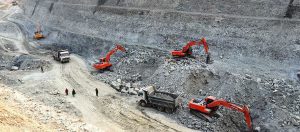
Bhim Lal Maharjan, an 81-year-old resident of the ancient town of Khokana in southern Lalitpur, harks back to the good old days when he used to carry a kharpan (a bamboo pole to carry goods by balancing it on the shoulder of the carrier) carrying mustard oil and roam around the Kathmandu Valley.
“I used to go around Patan area to trade the oil,” he recalls, “Some would buy the oil and some used to exchange that with mustard seeds. It was always profitable.” However, Maharjan’s family has already discontinued the lucrative trade. His sons are involved in different professions.
Khokana’s name has always been associated with the production of mustard oil for centuries. But, a very few today are involved in the home-based industry these days. Nevertheless, the traditional identity of the town has not been overshadowed by modernisation and urbanisation yet as in the cases of sukuls of Siddhipur and pyangs of Pyang-gaun. Only the mode of production has changed.
The paradigm shift
 “I buy the oil from other oil mills these days. There are fewer people but they produce at a greater scale,” Maharjan believes this is not the end of the oil industry in Khokana, but just a shift in the way it is practised. Khokana still produces a significant amount of mustard oil with several community-owned oil mills.
“I buy the oil from other oil mills these days. There are fewer people but they produce at a greater scale,” Maharjan believes this is not the end of the oil industry in Khokana, but just a shift in the way it is practised. Khokana still produces a significant amount of mustard oil with several community-owned oil mills.
For example, one of them is Sikali Multipurpose Cooperative Oil Mill. “Our mill produces 200 to 250 litres of mustard oil a day,” says the mill’s Siddhi Sharan Maharjan, “The mill is operated for around 25 days a month.”

Similarly, Gaabu Jyaasha Oil Mill, one of the oldest mills owned by the locals of Gaabu Tole of Khokana and leased by Kancha Maharjan, produces around 120 litres of mustard oil every day.
These mills still operate fully functional traditional machines to extract 80 per cent of the total production. A typical traditional oil mill in Khokana uses two large wooden pieces to crush roasted mustard seeds and extract out the oil. The crushing is with a lever rotated manually. In the mass-scale mills that are operational today, the same process is done. In addition, the residue is processed by an electrically-run machine that also contributes around 20 per cent share to the total production.
According to Siddhi Sharan, three kilograms of mustard seeds are required to extract one litre of mustard oil.
A shift in the source
Another significant change that Khokana’s mustard oil industry has undergone is the source of the raw material, the mustard seeds. In the past, the locals used to collect the seeds mostly from the field on the outskirts of Khokana. Or, as Bhim Lal informs, they used to get it in barter with residents of other parts of the valley. But both the sources have gone dry these days though the production amount is almost the same.
 “Most of the mustard grown here is used by the farmers themselves,” says Siddhi Sharan. “We bring tonnes of mustard seeds from elsewhere such as Chitwan, Dang, Bardiya, and from India.”
“Most of the mustard grown here is used by the farmers themselves,” says Siddhi Sharan. “We bring tonnes of mustard seeds from elsewhere such as Chitwan, Dang, Bardiya, and from India.”
And since mustard is brought from elsewhere, the taste of the oil produced is not the same as before. “The mustard seeds used in the past were grown in the mountains in a different atmosphere and moisture than from the places we import from,” explains Siddhi Sharan. “With ever-growing rapid urbanisation, mustard fields around the valleys are shrinking.”
Because the millers have to visit faraway places to collect the mustard seeds, the production cost has increased and it gives them fewer profits, laments Siddhi Sharan. “We buy mustard at Rs 85 per kilogram and sell the oil at around Rs 250 per litre. So there is not much profit,” he says, adding “We cover our loss by selling the residue (called ‘pina’ in Nepali) to cover our expenses.”
Pina is used as food for cattle.
‘Healthy’ oil in the ‘unhealthy’ market

Financially, there is yet another concern that troubles the millers like Siddhi Sharan. He is surprised how the packaged oil easily available in the market is cheaper even when the price of raw materials is very high. He, hence, suspects that such refined oils are adulterated. “They mix palm oil and other chemicals in their product in order to cut back on the price.”
But, to his further bemusement, the oil companies brand their products as ‘cholesterol-free’. “Plants and plant-based products do not have cholesterol in them. Plants do not produce cholesterol. It is only found in animals.”
He believes the lack of any compromises in the quality of oil produced in Khokana is the reason that mustard oil produced here is healthy. But since packaged oil is easily available in the markets at a cheaper price, people do not opt for Khokana’s products much.

“Mustard oil has many health benefits and is good for a human heart. We explain the health benefits to our customers because many of them question the use of mustard oil at first,” he says.
Concerned local authority
Meanwhile, it seems preservation and promotion of the traditional oil industry as Khokana’s identity has been a priority of the elected local authorities. The industry has been included in the plans and policies of the concerned local government.
 “The oil mills that were damaged by the 2015 earthquake are being reconstructed. We have allocated adequate budget,” says Rabindra Maharjan, the chairperson of Lalitpur metropolitan city’s ward 21 which covers Khokana also. “We are planning to produce mustard oil from one of these mills within this year. We are also reconstructing Kutushaa, the oldest oil mill of Khokana”
“The oil mills that were damaged by the 2015 earthquake are being reconstructed. We have allocated adequate budget,” says Rabindra Maharjan, the chairperson of Lalitpur metropolitan city’s ward 21 which covers Khokana also. “We are planning to produce mustard oil from one of these mills within this year. We are also reconstructing Kutushaa, the oldest oil mill of Khokana”
According to Rabindra, all of these oil mills will operate in the community-ownership model so that everyone takes ownership of these mills and be involved in the production of mustard oil. He also states that the quality of the oil produced will not be compromised.






















